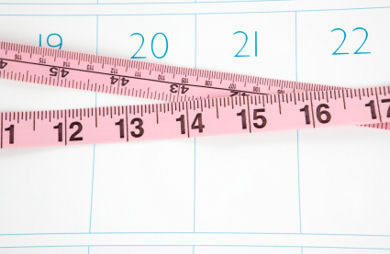What do you do while you eat?
If you watch television, work on your computer, page through a magazine or pay your bills while enjoying your lunchtime chicken salad or grilled salmon dinner, you're not alone—but you're also not doing your waistline any favors. Studies have shown that people who ate while distracted consumed 69 percent more than those who ate with no distractions.
The key is to learn mindful eating, which means focusing your attention on the foods you select, prepare and eat. As you become more aware of the taste and texture of each bite, you'll be more likely to slow down and savor the foods instead of shoveling them in on autopilot.
Most people don't realize how important mindful eating is to their physical, emotional and even spiritual health," says Lorraine Miano, health coach with Infinite You Health. "We often lose the sense of connection and awareness to the nourishing benefits of our meals. Instead, we look upon them as stressful—especially if we're in constant dieting mode or worrying about cravings or body image obsessions."
Try using some of these mindful eating tips from the experts to stop the mad dining dash and start being more aware of what and how much you're consuming.
1. Learn to recognize hunger.
In many cases, mindless eating is driven by reasons other than physiological hunger, such as stress, sadness or boredom. "It can be tough to tell the difference between actual physical hunger and emotional hunger," says Alissa Rumsey, R.D., owner of Alissa Rumsey Nutrition & Wellness Consulting. "Learning to recognize non-hunger triggers for eating is an important step in mindful eating."
The next time you find yourself reaching for a snack, ask yourself, "Would I eat a carrot right now?" (Not a fan of carrots? Substitute a healthy food you enjoy.) If the answer is "yes," eat the carrots (or other food) to provide nourishment. If the answer is "no," then you’re likely experiencing emotional hunger.
2. Eliminate distractions.
Before each meal, start by turning off all technology. All of those emails, television shows and phone calls can wait until you've finished eating. "At home, I have an electronics bowl where all my children put their phones when we have dinner and the television is turned off," says Toby Amidor, nutrition expert and author of "The Greek Yogurt Kitchen." "This gives us an opportunity to enjoy the lost art of conversation."
Instead of outside distractions pulling you away from your meal, focus on the foods on your plate: the tastes, textures and colors. "Use your senses to truly taste, feel, smell and even touch your food," suggests Miano. "Take the time to notice how each of your senses responds to the food you are eating. Chew slowly and savor each bite." One of the benefits of eating slower is that you'll pay better attention to how your hunger lessens and then subsides as you eat.
3. Shop at farmers markets.
When you shop at a small market, you have more opportunities to meet the people who are selling the food you are eating. "Studies show that you are much more likely to have conversations at these smaller markets, which can lead to learning more about the foods you are eating," says Ken Immer, president of Culinary Health Solutions. "Once you have a story about the foods and ingredients, you’ll be more likely to make a conscious choice and develop a more mindful cooking and eating practice."
Dietitian Becky Hand agrees that farmers markets offer ample benefits. "Take time to talk to the vendors or the actual farmers," she suggests. "Understanding the hours of labor, skills used and resources needed to feed the masses increases one's appreciation for the food."
4. Change your route or routine.
A great deal of mindless eating is triggered by habit. Immer suggests mixing up your routine to avoid automatic indulgences. For example, if you always walk past a coffee shop and stop in for a sugary pastry, choose to walk a different way on some days. That way, the pastry will become an occasional treat instead of a daily habit.
5. Keep your refrigerator and pantry organized.
Many people get frustrated when they open a full pantry or refrigerator, which leads to unconscious and reactive choices. Immer recommends designating one shelf of the fridge for leftovers and use the "one in, one out" rule. "Once the space is full of leftovers, if you’re going to add something new, you have to get rid of something else, either by throwing it away or by getting it ready for your next meal. That way, you keep the clutter down and force yourself to make choices."
6. Think about the source.
Rather than focusing on the food once it's on the plate, health coach Liza Baker from Simply: Health Coaching prefers to think about its origin from the very beginning of the food chain. For example, knowing how and where your food was grown, as well as who raised, harvested, processed, packed, transported, prepared and sold it to you are all important considerations.
"Focusing on SOLE food—that which is seasonal, organic, local and ethical—is good for not only your physical health, but also the health of the environment and the local economy," says Baker. "Committing to eating in this manner is not easy, but it will make you think about every bite you take."
Not sure where to start? Baker suggests reading labels, buying more at your local farmers market or choosing locally labeled foods in your grocery store.
7. Carry your own flatware.
Immer recommends purchasing a nice set of bamboo or other portable flatware that comes in a handy travel pouch. "When ordering at a quick-serve restaurant, pull out your flatware," he suggests. "You’ll feel more at home and will likely eat slower and more mindfully."
Bringing Mindfulness to the Table
The key to mindful eating success is to start with small, simple steps. Implement easy techniques to eat more slowly, experience the flavors of food more intensely and seek pleasure in the entire eating process.
"This level of focus is difficult to maintain," says Hand. "You probably won’t be able to do it 100 percent of the time. But like all new habits, it's a work in progress." Hand suggests setting weekly goals as you increase the number of meals and amount of time you are able to dedicate to your mindful eating practice.
|
|





















.jpg)